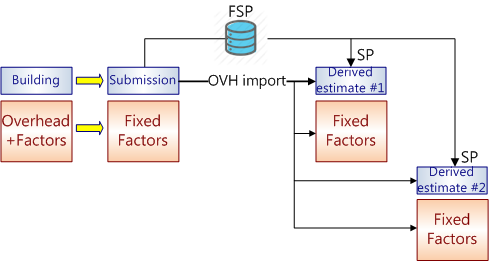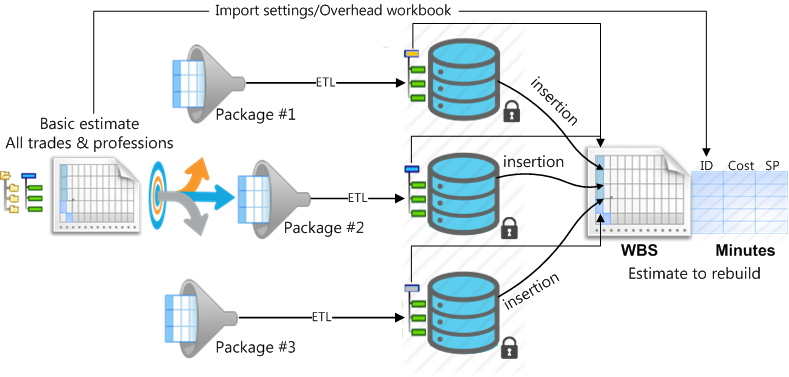Use Case
An IDIQ Indefinite Duration Indefinite Quantity contract starts with a basic estimate with arbitrary quantities; when the contract is awarded, the contractor commits to keeping its selling prices per unit steady during a fixed period of time, and regardless of the ordered quantities.
For this purpose a database imposing the selling prices per unit of future estimates is worth being built.
Out-of-the-Box Functions
QDV7 features special functions to rebuild an estimate when an order is placed:
▪A tool to build contract databases used to import costs and selling price
▪Optionaly, cascading Market coefficients above or under à 1 adjust the selling prices to include revision, negotiation, or others. They are known as directs coefficients. The result of multiplication is applied to selling prices
▪The purchaser's cost centers can be reused to classify the report
▪The nomenclatures of succeeding estimates can be merged. (Refer to Cross-Estimate Nomenclatures).
To monitor all the costs, while keeping the forced selling prices constant over the course of time, QDV7 populates from the basic estimate:
▪a database whose sets are the tasks of the basic estimate, and the articles its Minutes
▪a database of articles that supplements the manufacturers' databases
▪optionaly, a database whose articles are the tasks with their selling price per unit in the Forced selling price per unit column.
Hence, the calculated costs and selling prices are available, and can be displayed against each other to calculate margins.
To meet the IDIQ Contract requirements,
▪QDV7 pastes the Line selling prices per unit of the basic estimate into the Forced selling price per unit column
▪and sets to 1 the Take forced selling price per unit column of the set database.
The potential Forced selling prices per unit of Material and Workforce (or of another resources set) (Refer to Description) are NOT taken into account.
The Total Mode is supported, provided it is defined in the WBS. In the Articles pane of the set database, the quantity is equal to the quantity in the Minutes view divided by the quantity of the task in total mode; il the latter is 0, the former is also 0.
Preparations Before Award
Make sure there is no forced price at the WBS level, nor links (Refer to Links Between Tasks), nor Target in the Overhead workbook. Otherwise, QDV7 deletes these task data.
Shift the calculation mode to Fixed Coefficients. (Answer No to the message prompting to restore old values.) (Refer to How to Compute the Selling Prices.)
Take-Away

Screens Footage
In this example, we do not use any Projects Management and build the database with the Write SP option and with the Family field as Tree view structure field.
The basic estimate features 2 packages:
▪HVAC package: Zone is a set of Minutes
▪Road work package: Hookup is a set of Minutes.
We rebuild the estimate by inserting the sets to the Minutes view. We do not use Market coefficients.
Basic estimate, then New estimate |
Insert |
IDIQ.grp database |
|
|
|
If several trades or professions are involved, it may be handy to have specialized databases. For this purpose, you filter the WBS of the basic estimate just before populating the databases.
It may be preferred to insert the sets into the WBS (rather than in the Minutes view) to separate them by titles in the report and show sub-totals. (This encapsulation can be removed later.) In addition, this method allows you assign market coefficients on a task basis.
These two variants can be combined as follows:

To append tasks after the databases generation, do not empty them for the second one.
Progress Statements Function
Progress Statements can be done to link the succeeding estimates, and follow up the progress in terms of quantities and invoices.
In this case the quantities and total costs in the reference estimate's Minutes matter as they are targets.
The procedure is entirely different. It is aided by macros.
Refer to Progress Statements.
Topic content
Rebuilding Estimate For Orders